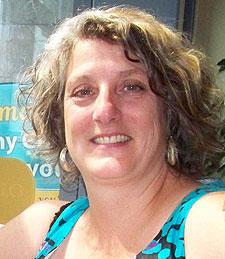Flying under the radar at this year’s Pride festivities was Nancy Jo Cullen.
Because of the week’s spectacle, controversy and, let’s face it, the scorching weather, Cullen’s achievement wasn’t part of the weekend’s news cycle.
Cullen was inducted into rarefied company as a recipient of the Dayne Ogilvie Grant, which recognizes a big gay or lesbian talent early in his or her career. Previous winners are Zoe Whittall, Michael V Smith and Debra Anderson.
Cullen was presented the $4,000 grant on July 4 at the Proud Voices stage.
“Winning the big award was so bloody exciting!” says Cullen.
She was surprised, she says, because she assumed she was not eligible. What threw her off was the word “emerging” — she thought she was “too old for the award.”
“It was absolutely surprising and thrilling to get the call. As a queer writer, being recognized by my peers through the Dayne Ogilvie Grant is fantastic,” says Cullen.
The jury — writers Brian Francis, Don Hannah and Suzette Mayr — describe Cullen as “a writer who feels like a friend.”
“She tackles dark corners without false dramatics or pretensions. There is a genuine realness in her language,” they wrote in her citation.
Originally from British Columbia and a long-time resident of Calgary, Cullen, a 48-year-old mother of three, was involved in theatre for years. She now lives in Toronto while completing an MFA in creative writing at the University of Guelph-Humber. She is the author of three collections of poetry, Science Fiction Saint (2002), Pearl (2006) and Untitled Child (2009.)
In Pearl, a collection about Pearl Miller, Calgary’s most financially successful madam, Cullen explores themes of sex work, war and economic bad times in the early 1900s, all applicable to our present day.
In “By the End of the Great War” Cullen writes:
Those soldiers were anxious to feel the world between their legs before they shipped off to slaughter, each boy knowing he was as likely as the next to be gone for all eternity.
“I don’t want to prettify things. I want to name/identify the world from my place: feminist, lesbian, post-Catholic — for me, unfortunately not for the rest of the world — mother, bitch, angry woman,” says Cullen.
Her poem “526-9 Avenue SE” luminates some of the ugly in our society:
Although the city starves, thy walls shall flourish.
Harlots give proof of what man will pursue
Though work be lost and children be malnourished.
With Untitled Child, her latest collection, Cullen says, “I wanted to name /explore the death of a partner and our struggle with her addiction and mental illness, so I think of it as a confessional piece, still with a strong narrative.”
Untitled Child plays on words, such as the title “Once an Addict, Always”; list poems, such as “Faith is the Substance of Things Hoped For”; and the opportunity to challenge the medical industry, as in “To the Office of the Chief Medical Examiner.”
“The Dayne Ogilvie Grant is a fine example of the progress of the queer community into ‘polite’ society. As long as we don’t become too polite, then I think it’s damn wonderful,” says Cullen.
Cullen is not polite or rude; she is brave, honest, critical and empathetic.
She is currently working on a collection of short stories.
“I hope that my poetry and stories are a welcome relief to people who rarely find themselves represented in mainstream stories,” Cullen says.

 Why you can trust Xtra
Why you can trust Xtra


